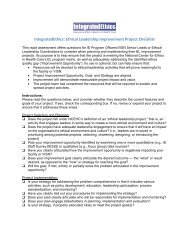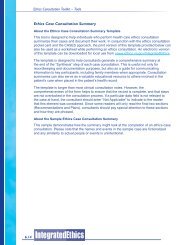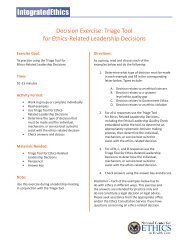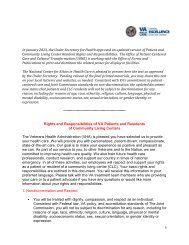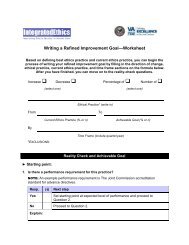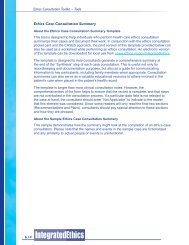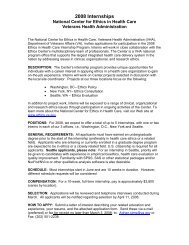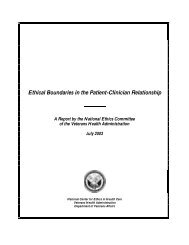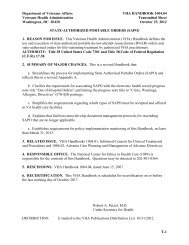Preventive Ethics - National Center for Ethics in Health Care - US ...
Preventive Ethics - National Center for Ethics in Health Care - US ...
Preventive Ethics - National Center for Ethics in Health Care - US ...
Create successful ePaper yourself
Turn your PDF publications into a flip-book with our unique Google optimized e-Paper software.
Part II: Introduction to <strong>Preventive</strong> <strong>Ethics</strong><br />
“Total <strong>Ethics</strong> Management.”[41] Today, many agree that “the most excit<strong>in</strong>g prospects <strong>for</strong><br />
ethics committees and consultants <strong>in</strong>volve <strong>in</strong>tegrat<strong>in</strong>g them <strong>in</strong>to the quality improvement<br />
culture of health care organizations.”[42]<br />
With <strong>in</strong>creas<strong>in</strong>g recognition of the importance of systems approaches to ethics <strong>in</strong> health<br />
care, reactive ethics programs that focus primarily on specific ethics cases are no longer<br />
adequate. Instead, every health care facility must have an effective preventive ethics<br />
function to identify, prioritize, and address ethics quality gaps proactively on a systems<br />
level.<br />
As the largest health care system <strong>in</strong> the country and a recognized leader <strong>in</strong> per<strong>for</strong>mance<br />
measurement and management, VA is uniquely situated to translate its real-life experience<br />
<strong>in</strong>to “how to” guidance on preventive ethics. This document builds on well-established<br />
concepts of cont<strong>in</strong>uous quality improvement and takes advantage of VA’s unique<br />
<strong>in</strong>stitutional capacity to develop an orig<strong>in</strong>al approach to implement<strong>in</strong>g a dist<strong>in</strong>ct preventive<br />
ethics function <strong>for</strong> health care organizations.<br />
Models <strong>for</strong> Per<strong>for</strong>m<strong>in</strong>g <strong>Preventive</strong> <strong>Ethics</strong><br />
The need <strong>for</strong> dedicated structures and processes<br />
Ideally, all health care providers <strong>in</strong> an organization should be <strong>in</strong>volved <strong>in</strong> identify<strong>in</strong>g,<br />
prioritiz<strong>in</strong>g, and address<strong>in</strong>g ethical issues on a systems level. As a practical matter,<br />
however, the preventive ethics function needs to be associated with specific organizational<br />
structures and processes. To be effective, every preventive ethics function must have:<br />
• someone to coord<strong>in</strong>ate the function (a preventive ethics coord<strong>in</strong>ator)<br />
• staff to carry out preventive ethics activities<br />
• an organiz<strong>in</strong>g structure (a preventive ethics team or teams)<br />
• a specific, systematic approach<br />
Why? Clear leadership <strong>for</strong> the function is important because preventive ethics doesn’t just<br />
happen spontaneously; it demands active management. Measur<strong>in</strong>g ethics quality often<br />
requires special resourcefulness and ef<strong>for</strong>t, s<strong>in</strong>ce ethical practices are often difficult to<br />
objectify or quantify.[43,22] Unless someone is specifically charged with responsibility <strong>for</strong><br />
seek<strong>in</strong>g out and address<strong>in</strong>g systemic ethics issues, such issues tend be neglected.[44,45]<br />
Moreover, because the concept of preventive ethics is relatively new <strong>in</strong> health care, it may<br />
be unfamiliar to staff. Thus preventive ethics must have champions to expla<strong>in</strong> it and promote<br />
it <strong>in</strong> the organization, as well as workers to carry it out. And we know from other contexts<br />
that effective health care improvement teams need strong team leadership and high levels<br />
of teamwork [46] that <strong>in</strong>dividuals or specially convened groups alone cannot provide. F<strong>in</strong>ally,<br />
preventive ethics calls <strong>for</strong> adapt<strong>in</strong>g quality improvement methods specifically <strong>for</strong> ethics <strong>in</strong><br />
health care. Do<strong>in</strong>g this well requires specialized skills and knowledge and a specific method<br />
or process, as well as group learn<strong>in</strong>g over time.<br />
15



